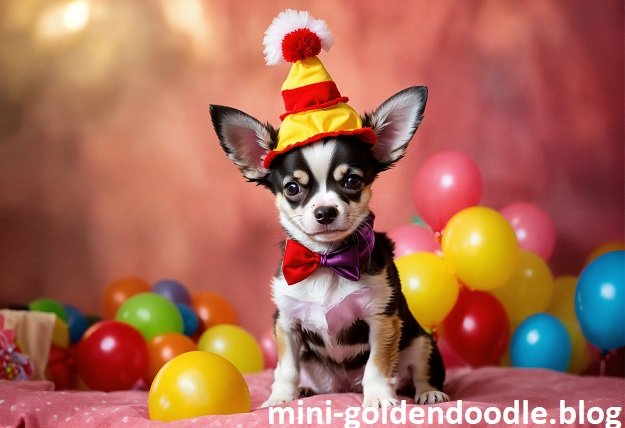Introduction
Bringing a Chihuahua puppy home may be a thrilling and fulfilling experience. One of the most well-liked toy breeds in the world, Chihuahuas are noted for their small stature and lively dispositions. Whether you’re a seasoned pet owner or just starting out, this in-depth book will teach you all you need to know about raising a Chihuahua puppy from adoption to adulthood.
Understanding the Chihuahua Breed
The tiniest dog breed to come out of Mexico is the Chihuahua. These little friends, who are typically 6 to 9 inches tall and weigh between 2 and 6 pounds, have a lot of personality packed into their little bodies. They are renowned for their attentiveness, devotedness to their masters, and lively personalities that contrast with their diminutive stature. Chihuahuas are charming and appealing pets because of their diverse coat colors and patterns.
Choosing a Chihuahua Puppy
Choosing the prettiest puppy isn’t the only step in choosing the ideal Chihuahua. It is important to take into account aspects including temperament, health, and the breeder’s or adoption agency’s reputation. Seek for curious, playful, and amiable puppies as these qualities frequently point to a well-socialized and versatile dog. Furthermore, make sure that the puppy’s surroundings and parents are hygienic and clean, as these factors greatly affect the puppy’s general wellbeing.
Preparing Your Home for a Chihuahua Puppy
It’s crucial to prepare your home for a Chihuahua puppy’s arrival by making it safe and comfortable. Puppy-proofing your home involves taking out small, ingestible objects and electrical cables, among other possible hazards. Create a comfy sleeping space for your puppy to rest in, complete with a bed or crate. Assemble basic supplies like premium puppy food, food and water bowls made of stainless steel, a collar and leash, toys to keep the puppy’s mind active, and grooming items like soft brushes and nail clippers.
Feeding and Nutrition
A Chihuahua puppy’s petite stature and special dietary requirements mean that feeding them takes careful attention. Select a premium puppy food that has been specially designed for small breeds and has the ideal ratio of nutrients for healthy growth and development. To avoid hypoglycemia, which is a typical problem in tiny puppies, divide their daily food intake into multiple short meals. Throughout their growth phases, keep an eye on their weight and modify portion sizes as necessary to maintain a good body condition.
House Training and Socialization
A Chihuahua puppy needs to be housebroken with care, persistence, and positive reinforcement. Start them out right by scheduling regular toilet breaks and rewarding them with praise and prizes when they go potty in the allotted area. For your puppy to grow up to be self-assured and well-mannered among humans, other animals, and other situations, socialization is equally crucial.
Exercise Requirements
Chihuahuas are lively dogs despite their small stature, and they need frequent exercise to keep happy and healthy. Take them on quick strolls around the neighborhood or let them play in a safe backyard to help them get rid of extra energy and keep their minds active. Particularly during their growing periods, take care of their fragile bones and joints and refrain from overdoing it or engaging in activities that could injure them.
Grooming Tips for Chihuahuas
Compared to other breeds, Chihuahuas require less maintenance with their short coat. Frequent brushing with a soft-bristled brush aids in maintaining their coat’s luster and health, removing loose hair, and distributing natural oils. Bathe your Chihuahua as needed with a light dog shampoo to maintain their skin clean and clear of dirt or debris, depending on their activity level and surroundings.
Health Care and Common Issues
It’s important to provide your Chihuahua puppy with preventive care, immunizations, and routine veterinary checkups to keep them healthy. Make regular consultations with a veterinarian to oversee their growth, give required immunizations against prevalent canine illnesses, and go over parasite prevention strategies like preventing fleas and ticks. Due to their small mouths, Chihuahuas are prone to a number of health problems, such as hypoglycemia (low blood sugar),
Training and Behavioral Tips
To train a Chihuahua puppy and reward excellent behavior, one must be patient, consistent, and employ positive reinforcement methods. To motivate them, start with simple orders like sit, remain, and come. You can use food or praise as rewards. Given that Chihuahuas are independent-minded and quickly distracted, keep training sessions brief and interesting to keep their interest.
Traveling and Safety Tips
To guarantee your Chihuahua puppy’s comfort and safety while traveling by automobile or airplane, meticulous planning is necessary. Purchase a travel carrier that is roomy enough for your dog to stand up, turn around, and lie down comfortably. It should also be robust and well-ventilated. To lessen anxiety during travel, gradually introduce children to the carrier with positive connections like toys or snacks. Use a portable dish or tiny water bottle to keep your puppy hydrated, and take frequent stops to let them use the restroom and stretch their legs.
Conclusion
It’s a happy occasion to welcome a Chihuahua puppy into your home, but it does require some thought and planning. You can make sure your puppy develops into a happy, healthy, and well-mannered adult dog by being aware of their special needs from the start and giving them the attention they require. To forge a solid link and make enduring memories with them, don’t forget to give priority to their grooming, training, nutrition, exercise, and healthcare. You can have a fulfilling experience as a puppy parent with perseverance, love, and commitment, and you’ll get to enjoy your furry friend’s company and devotion for years to come.
FAQ
How long do Chihuahuas live?
Chihuahuas typically live 12 to 20 years, and a longer longevity can be attained with good nutrition and care.
Are Chihuahuas good with children and other pets?
Chihuahuas get along well with older kids who know how to treat little dogs with kindness. Early socialization can also improve their ability to get along with other animals.

